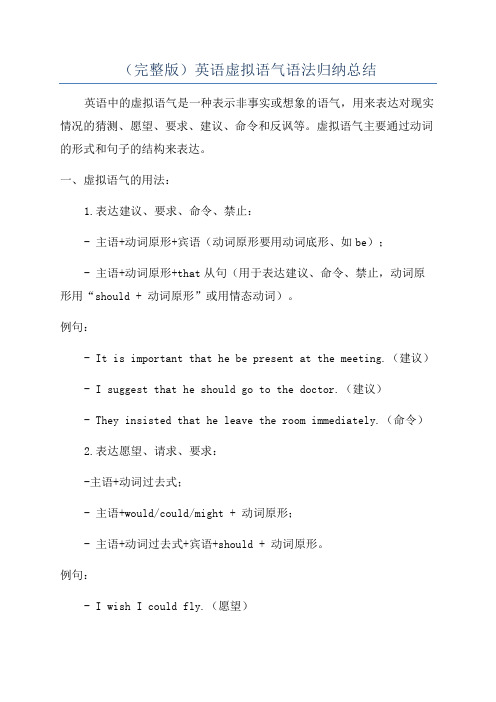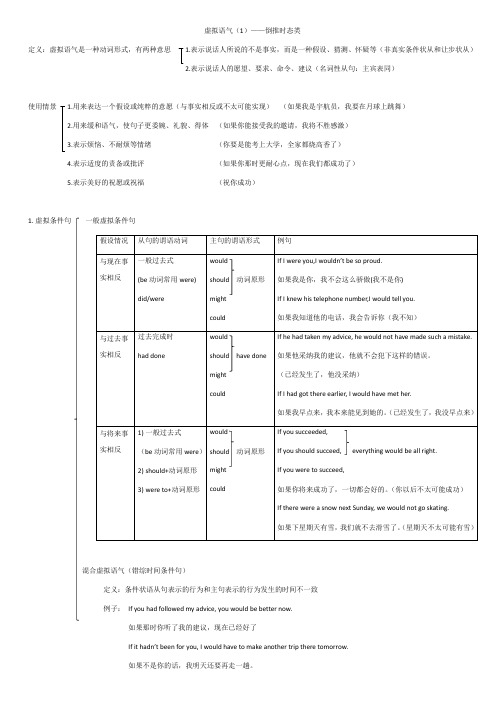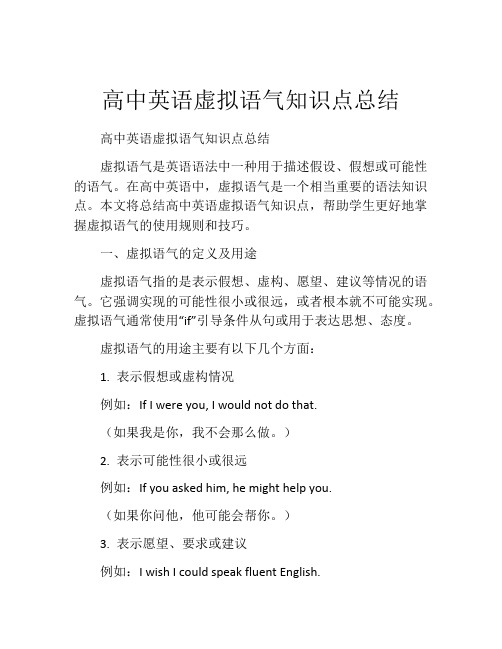高中英语 第二册 语法总结 虚拟语气
高中英语知识点归纳虚拟语气的用法和条件句的种类

高中英语知识点归纳虚拟语气的用法和条件句的种类高中英语知识点归纳:虚拟语气的用法和条件句的种类虚拟语气是英语中的一种语法现象,用来表示与实际事实相反、假设、愿望等情况。
在高中英语学习中,掌握虚拟语气的用法以及条件句的种类是非常重要的。
本文将对这两个知识点进行归纳,并提供一些例句帮助理解。
一、虚拟语气的用法1. 表示与事实相反:(1)与现在事实相反:与现在事实相反的虚拟语气通常以“were”作为谓语动词的过去式形式出现,无论主语为单数或复数。
例句:- If I were a bird, I would fly across the sky.- I wish I were taller.(2)与过去事实相反:与过去事实相反的虚拟语气通常以“had + 过去分词”构成,表示对过去情况的虚拟推测。
例句:- If he had studied harder, he would have passed the exam.- I wish I had known about the party.2. 表示假设、愿望或建议:(1)表示假设:虚拟语气可以用来表示假设的情况,常用的动词有“co uld, might, would, should, ought to”等。
例句:- If I had a million dollars, I would travel around the world.- If it rained tomorrow, we could stay indoors.(2)表示愿望:虚拟语气可以用来表示对现实情况的愿望,常用的动词有“wish, hope, pray”等。
例句:- I wish I could speak fluent French.- I hope she arrives on time.(3)表示建议:虚拟语气可以用来表示对现实情况的建议,使用“should + 动词原形”。
高中英语虚拟语气语法总结

高中英语虚拟语气语法总结在高中英语语法中,虚拟语气是一个重要的语法点。
在许多情况下,虚拟语气被用于表达假设、愿望和不可能的状态等。
本文将为大家总结高中英语中常见的虚拟语气语法。
一般现在虚拟语气(Present Subjunctive)一般现在虚拟语气通常用于表达虚构的情况或假设的情况。
具体来说,当主句谓语是“would rather”、“it’s time”、“if”、“suppose”、“lest”、以及“as if/though”时,从句中的谓语动词需要使用一般现在虚拟语气。
举个例子: - I would rather he (be) here with me. 我宁愿他现在和我在一起。
(此处的“be”使用了一般现在虚拟语气) - If I (find) his phone number, I would call him. 如果我找到他的电话号码,我就会打电话给他。
(此处的“find”使用了一般现在虚拟语气) - Don’t speak lest she (should) hear you. 不要说话,唯恐她听到。
(此处的“should”是虚拟语气的标志)需要注意的是,虽然一般现在虚拟语气的形式和一般现在时相同,但是在一些情况下,虚拟语气需要加上“should”或“were”等词汇来表示。
过去虚拟语气(Past Subjunctive)过去虚拟语气通常用于表达假设的情况或虚构的情况。
在从句中,虚拟语气的形式由过去式或过去分词构成。
主句通常使用“could”、“would”或“might”等词汇,有时也可以使用过去时态来表示虚拟情况。
举个例子: - If Mary (had) known you were in hospital, she would have come to see you. 如果玛丽知道你住院了,她一定会去看望你的。
(此处的“had”使用了过去虚拟语气,表示假设的情况)需要注意的是,过去虚拟语气的使用非常灵活,要根据实际情况来判断是否使用虚拟语气。
(完整版)英语虚拟语气语法归纳总结

(完整版)英语虚拟语气语法归纳总结英语中的虚拟语气是一种表示非事实或想象的语气,用来表达对现实情况的猜测、愿望、要求、建议、命令和反讽等。
虚拟语气主要通过动词的形式和句子的结构来表达。
一、虚拟语气的用法:1.表达建议、要求、命令、禁止:- 主语+动词原形+宾语(动词原形要用动词底形、如be);- 主语+动词原形+that从句(用于表达建议、命令、禁止,动词原形用“should + 动词原形”或用情态动词)。
例句:- It is important that he be present at the meeting.(建议)- I suggest that he should go to the doctor.(建议)- They insisted that he leave the room immediately.(命令)2.表达愿望、请求、要求:-主语+动词过去式;- 主语+would/could/might + 动词原形;- 主语+动词过去式+宾语+should + 动词原形。
例句:- I wish I could fly.(愿望)- I would appreciate it if you could help me.(请求)3.表示虚拟条件:- If条件从句中的谓语动词用过去完成时,主句用would/should/might/could + have + 过去分词;- If条件从句中的谓语动词用过去时,主句用would/should/could + 动词原形。
例句:- If I had known his phone number, I would have called him.(虚拟条件)- If you had listened to me, we could have finished the project earlier.(虚拟条件)4.表达建议、要求、祝愿:- If only内部称述 + 主语 + 过去式。
高中英语虚拟语气的用法归纳

高中英语虚拟语气的用法归纳以下是高中英语虚拟语气的用法归纳:虚拟语气是一种特殊的动词形式,表示假设、愿望、建议、命令、猜测等非真实的情况。
一、基本用法1. 与现在事实相反条件从句:If + 主语 + 动词过去式(be 动词用 were)主句:主语 + would/should/could/might + 动词原形例句:If I were you, I would study harder. (如果我是你,我会更努力学习。
)Wouldn't life be boring if we had everything we wanted? (如果我们想要什么就有什么,生活岂不是很无聊?)2. 与过去事实相反条件从句:If + 主语 + had + 过去分词主句:主语 + would/should/could/might + have + 过去分词例句:If I had known your phone number, I would have called you. (如果我知道你的电话号码,我就给你打电话了。
)Couldn't you have done better if you had tried harder? (如果你再努力些,难道不能做得更好吗?)3. 与将来事实相反条件从句:① If + 主语 + 动词过去式② If + 主语 + were to + 动词原形③ If + 主语 + should + 动词原形主句:主语 + would/should/could/might + 动词原形例句:If it rained tomorrow, we would stay at home. (如果明天下雨,我们就待在家里。
)If she were to come here tomorrow, I would be very happy. (如果她明天来这儿,我会非常高兴。
)If he should fail in the exam, how disappointed his parents would be!(要是他考试不及格,他父母该多失望啊!)二、固定搭配1. wish 后的宾语从句与现在事实相反:从句用一般过去时与过去事实相反:从句用过去完成时与将来事实相反:从句用 would/could + 动词原形例句:I wish I were as tall as you. (我希望我和你一样高。
高中英语之虚拟语气详细讲解

虚拟语气(1)——倒推时态类定义:虚拟语气是一种动词形式,有两种意思 1.表示说话人所说的不是事实,而是一种假设、猜测、怀疑等(非真实条件状从和让步状从)2.表示说话人的愿望、要求、命令、建议(名词性从句:主宾表同)使用情景 1.用来表达一个假设或纯粹的意愿(与事实相反或不太可能实现)(如果我是宇航员,我要在月球上跳舞)2.用来缓和语气,使句子更委婉、礼貌、得体(如果你能接受我的邀请,我将不胜感激)3.表示烦恼、不耐烦等情绪(你要是能考上大学,全家都烧高香了)4.表示适度的责备或批评(如果你那时更耐心点,现在我们都成功了)5.表示美好的祝愿或祝福(祝你成功)1.虚拟条件句一般虚拟条件句混合虚拟语气(错综时间条件句)定义:条件状语从句表示的行为和主句表示的行为发生的时间不一致例子:If you had followed my advice, you would be better now.如果那时你听了我的建议,现在已经好了If it hadn’t been for you, I would have to make another trip there tomorrow.如果不是你的话,我明天还要再走一趟。
If you had studied hard before,you would be a college student now.如果你以前努力学习的话,你现在就是大学生了。
省略+倒装当虚拟条件句的谓语动词中含有were,should,had时,if可以省略,并将were,should,had提前于句首,变为倒装句。
如果虚拟条件句是否定句,not 保留在原处If he should agree to go there, we should send him there.= Should he agree to go there,we should send him there.If she were there,she would agree with us.= Were she were, she would agree with us.If he had learnt about computers,we would have hired him.= Had he learnt about computers,we would have hired him.含蓄虚拟条件句定义:有时为了表达的需要,在虚拟语气中并不总是出现if引导的条件状语从句,而是通过其他手段来代替条件从句分类:1) but for....=(If it+be not for) ;without;Without your help ,we couldn’t have finished the work ahead of time.= But for your help,we couldn’t have finished the work ahead of time.= If it hadn’t been for your help,we couldn’t have finished the work ahead of time.没有你的帮助,我们不可能完成任务。
虚拟语气英语知识点总结

虚拟语气英语知识点总结一、虚拟语气的概念。
虚拟语气是一种特殊的动词形式,用来表示说话人所说的话不是一个事实,而是一种假设、愿望、怀疑、猜测或建议等。
二、虚拟语气在条件句中的用法。
1. 与现在事实相反的虚拟条件句。
- 结构:从句(If + 主语+ 动词的过去式(be动词一般用were)),主句(主语+ would/should/could/might+动词原形)。
- 例如:If I were you, I would study harder.(如果我是你,我会更努力学习。
实际上我不是你)2. 与过去事实相反的虚拟条件句。
- 结构:从句(If+主语+had+过去分词),主句(主语+would/should/could/might + have+过去分词)。
- 例如:If he had taken my advice, he would have passed the exam.(如果他听了我的建议,他就会通过考试了。
实际上他没听建议,也没通过考试)3. 与将来事实相反的虚拟条件句。
- 结构:从句(If+主语+动词的过去式/should+动词原形/were to+动词原形),主句(主语+would/should/could/might+动词原形)。
- 例如:If it rained tomorrow, we would stay at home.(如果明天下雨,我们就会待在家里。
明天是否下雨还不确定,但这是一种假设情况)- 或者If he should come tomorrow, I would tell him the news.(如果他明天来,我就会告诉他这个消息)- 以及If I were to see her tomorrow, I would give her the book.(如果我明天见到她,我就会把书给她)三、虚拟语气在宾语从句中的用法。
1. wish后的宾语从句。
- 表示与现在事实相反的愿望,从句谓语动词用过去式(be动词用were)。
高中英语语法个人复习总结:虚拟语气

虚拟语气虚拟语气表示动作或状态不是客观存在的事实,而是说话人的主观愿望、假设、推测,有时甚至与事实相反。
一、虚拟语气在名词性从句中的用法1、在“It’s important/ strange/ natural/ necessary that…”这类句型里,that引导的主语从句中的谓语动词常用“(should) + V-原”结构。
eg: It’s necessary that he (should) be sent there at once.2、在动词wish 后的宾语从句中对过去的虚拟:had +过去分词wish that 对现在的虚拟:动词过去时(或动词过去进行时)对将来的虚拟:would/could + 动词原形eg: I wish that I had sent the old man to hospital in time.I wish that it were spring all the year round.She wishes that she were still living with her grandmother.I wish that you would/ could come soon.3、在表示建议、命令、要求的动词如:suggest/ advise/ propose/demand/ order/ command/ insist/ request/ desire/ require/ intend/recommend/ expect等后面的宾语从句中,谓语动词常用“(should) + V-原”结构。
eg: I suggest that we (should) set off at once.但其中两个词suggest与insist要注意使用:√要使用虚拟语气√暗示建议坚持要求坚持认为eg: Jean’s face suggested that she was ill, and her parents suggested that she (should) have a medical examine.The young man insisted that he had done nothing wrong, and heinsisted that he (should) be set free.4、在advice/ idea/ order/ demand/ plan/ proposal/ suggestion/ request等名词后面的表语从句和同位语从句中,谓语动词常用“(should) + V-原”结构。
高中英语虚拟语气知识点总结

高中英语虚拟语气知识点总结高中英语虚拟语气知识点总结虚拟语气是英语语法中一种用于描述假设、假想或可能性的语气。
在高中英语中,虚拟语气是一个相当重要的语法知识点。
本文将总结高中英语虚拟语气知识点,帮助学生更好地掌握虚拟语气的使用规则和技巧。
一、虚拟语气的定义及用途虚拟语气指的是表示假想、虚构、愿望、建议等情况的语气。
它强调实现的可能性很小或很远,或者根本就不可能实现。
虚拟语气通常使用“if”引导条件从句或用于表达思想、态度。
虚拟语气的用途主要有以下几个方面:1. 表示假想或虚构情况例如:If I were you, I would not do that.(如果我是你,我不会那么做。
)2. 表示可能性很小或很远例如:If you asked him, he might help you.(如果你问他,他可能会帮你。
)3. 表示愿望、要求或建议例如:I wish I could speak fluent English.(我希望我能说流利的英语。
)二、虚拟语气的形式虚拟语气形式主要有以下几种:1. 虚拟语气的过去式:在虚拟语气中,一般用过去式来表示对现在或未来的虚拟。
例如:If I had more time, I would read more books.(如果我有更多时间,我就会多看书。
)2. 虚拟语气的过去完成式:过去完成式用于表示“如果过去已经发生了某些事情,结果会是怎样”。
例如:If I had studied harder in high school, I would have gone to a better college.(如果我在高中时学习更努力,我就能进入更好的大学。
)3. 虚拟语气的“would + 动词原形”形式:“would +动词原形”形式通常用于表示愿望、要求、建议或者可能性。
例如:I wish you would stop smoking.(我希望你戒烟。
)If you would like to come, you are welcome.(如果你愿意来,欢迎你。
- 1、下载文档前请自行甄别文档内容的完整性,平台不提供额外的编辑、内容补充、找答案等附加服务。
- 2、"仅部分预览"的文档,不可在线预览部分如存在完整性等问题,可反馈申请退款(可完整预览的文档不适用该条件!)。
- 3、如文档侵犯您的权益,请联系客服反馈,我们会尽快为您处理(人工客服工作时间:9:00-18:30)。
新概念英语第二册语法总结:虚拟语气
虚拟语气分三种情况来掌握:
1、虚拟条件句。
2、名词性虚拟语气。
3、虚拟语气的其他用语。
一、虚拟条件句:
条件状语从句是非真实情况,在这种情况下要用虚拟语气。
1、条件从句与现在事实不一致,其句型为:
If 主语+过去时,主语+should(could, would, 或might)+动词原形,如:
If I were you, I would study hard.
If it rained, I would not be here now.
2、条件从句与过去事实不一致,句型为:
If 主语+had+过去分词,主语+should(could, would, 或might)+have+过去分词,如:If the doctor had come last night, the boy would have saved.
If I had not studied hard, I would have failed in the exam last term.
3、条件从句与将来事实不一致,句型为:
If 主语+should(were to, 过去时)+do,主语+should(could...)+原形do,如:
If it should rain tomorrow, we would stay at home.
If I were to go to the moon one day, I could see it with my own eyes.
If you missed the film to night, you would feel sorry.
注意问题:
1、If条件句中绝对不可出现"would"。
2、根据句中的时间状语,有时可能出现“混合虚拟”的情况,即主句可能是现在的情况,条件句也许是发生在过去的情况,但都是遵守上述句型。
3、在条件句中如果出现were, had, should可省去if,将主语与这些词倒装,例如:
Had the doctor come last night, the boy would have saved.
Were I to go to the moon one day, I would see it with my own eyes.
Should it rain tomorrow, we would stay at home.
二、名词性虚拟语气:
在表示命令、建议要求、惊叹时的名词性从句中需用虚拟语气,基本句型:主语+(should)+动词原形,如:Mother insisted that John go to bed at 9 o'clock.(宾语从句)We suggested that the meeting should not be held.
It was required that the crops should be harvested at once.(主语从句)
The suggestion that he be invited was rejected.(同位语从句)
That is their demand that their wages be increased.(表语从句)
注意:在这种句子中绝不出现"would""must""could"等。
三、虚拟语气在一些特殊词中的使用或含蓄条件句:
1、wish后的宾语从句:
与现在愿望不一致——主语+过去时:I wish I were you.
与过去愿望不一致——主语+had+过去分词:I wish I had visited the white House when I was in the states.
与未来愿望不一致——主语+would(could)+原形:I wish I could meet you tomorrow at the party.
2、It's time句型:
当It's time后用that从句时应该为“主语+should+原形”或“主语+过去时”,例如:It's time that you went to school. 或It's time that you should go to school.
3、If only引起的感叹句相当于“How I wish+宾语从句”:
If only he could come! 他要能来就好了。
If only I had known the answer! 我要早知答案就好了。
4、would rather, as if(though)引导的句子也需使用虚拟,表示过去的情况用过去完成时,表示现在与将来的情况用过去时,如:
I'd rather you posted the letter right away.
I'd rather you had returned the book yesterday.
She loves the children as if they were hers.
Alan talked about Rome as if he had been there.
5、without, but, but for, otherwise引起的短语或句子常暗含着含蓄条件:
Without you, I would never know him.
But for your cooperation, we wouldn't have done the work so well. = If it were not for your cooperation, we we wouldn't have done the work so well.
(注:without / but for... = If it weren't not for.../ If it hadn't been for...)But that she was afraid, she would have said no.
I would be most glad to help you, but I' am busy now.
I am busy now; otherwise I would do you the favor!
专项训练
1、It is important that a college student ______ a foreign language.
A.will master B.master C.masters D.would master
2、It is strange that she ______ without saying a word.
A.should have gone out B.went C.should go out D.goes out
3、If my lawyer ______ here last Saturday, he ______ me from going.
A.had been, would have prevented B.had been, would prevent C.were, would prevent D.were, would have prevent
4、——“He is a brave man.”
——“Yes, I wish I ______ his courage.”
A.have B.had C.will have D.may have
5、If it ______ rain, the crops would be saved.
A.should B.will C.is going to D.was to
6、He ordered that the medicine ______ by a special plane.
A.was sent B.would be sent C.should send D.be sent
7、If you ______ the medicine, you ______ better now.
A.took, would feel B.had taken, felt C.had taken, would feel D.took, would have felt
8、She is my sister, but she often acts as if ______ my mother.
A.is B.was C.were D.had been
9、I went to bed early last night, but I wish I ______ so.
A.didn’t do B.hadn’t do C.haven’t done D.couldn’t do
10、I’d rather he ______ tomorrow afternoon.
A.will come B.comes C.coming D.came
(后设答案,大家不要偷看哦~(*^__^*) 嘻嘻……)
KEYS
1、B
2、A
3、A
4、B
5、A
6、D
7、C
8、C
9、B 10、D。
